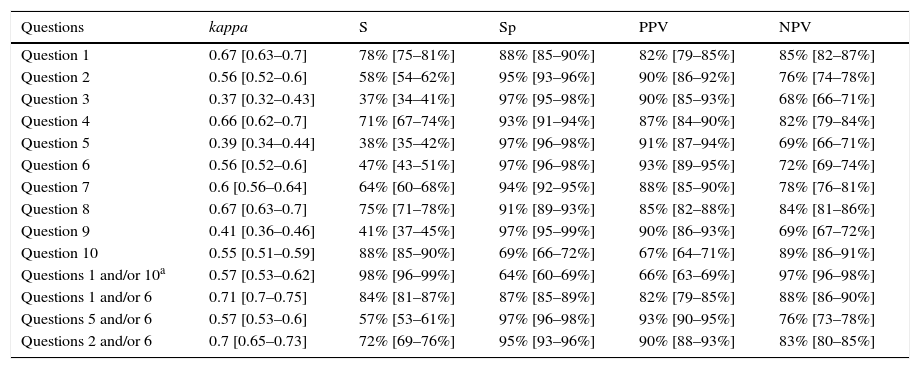To analyze the correlation, sensitivity, specificity and positive predictive (PPV) and negative predictive (NPV) values of each question on the Pfeiffer questionnaire (SPMSQ) compared with the full questionnaire for polypathological patients (PPPs).
MethodsMulticentre cross-sectional study. An SPMSQ score is considered pathological if 3 or more errors are recorded. For each question and combination of 2 questions, we calculated the correlation (kappa index), sensitivity, specificity and predictive values compared with the full SPMSQ.
ResultsOf the 1632 PPPs included (mean age, 77.9±9.8 years, 53% men), 1434 performed the SPMSQ (the remaining presented delirium); 39% of the PPPs were pathological. The question “What day is it today?” and the command “Count backwards by 3s from 20” obtained good correlation and NPV (85 and 89%, respectively); the combination of both increased the NPV to 97%. The question “When were you born?’ achieved good correlation and greater PPV (93%).
ConclusionsThe combination of the question “What day is it today?” and the command “Count backwards by 3s from 20” achieved a high NPV. The question related to the date of birth achieved the highest PPV.
Analizar la concordancia, sensibilidad, especificidad y valores predictivos positivo (VPP) y negativo (VPN) de cada pregunta del cuestionario de Pfeiffer (SPMSQ) con respecto al cuestionario completo en pacientes pluripatológicos (PPP).
MétodosEstudio transversal multicéntrico. El SPMSQ se consideró patológico si se registraban 3 o más errores. Para cada pregunta y combinaciones de 2 preguntas se calcularon la concordancia (índice kappa), sensibilidad, especificidad y valores predictivos con respecto al SPMSQ completo.
ResultadosDe los 1.632 pacientes pluripatológicos incluidos (edad media 77,9±9,8 años, 53% varones), se realizó el SPMSQ a 1.434 (los restantes presentaban delirium) y resultó patológico en el 39%. Las preguntas «¿qué día es hoy?» y «reste de 3 en 3 desde 20» obtuvieron buena concordancia y VPN (85% y 89%, respectivamente); la combinación de ambas aumentó el VPN al 97%. La pregunta «¿cuándo nació?» alcanzó buena concordancia y el mayor VPP (93%).
ConclusionesLa combinación de las preguntas «¿qué día es hoy?» y «reste de 3 en 3 desde 20» obtuvo un VPN elevado, y la relacionada con la fecha de nacimiento fue la que consiguió el mayor VPP.
Article
Diríjase desde aquí a la web de la >>>FESEMI<<< e inicie sesión mediante el formulario que se encuentra en la barra superior, pulsando sobre el candado.

Una vez autentificado, en la misma web de FESEMI, en el menú superior, elija la opción deseada.

>>>FESEMI<<<








